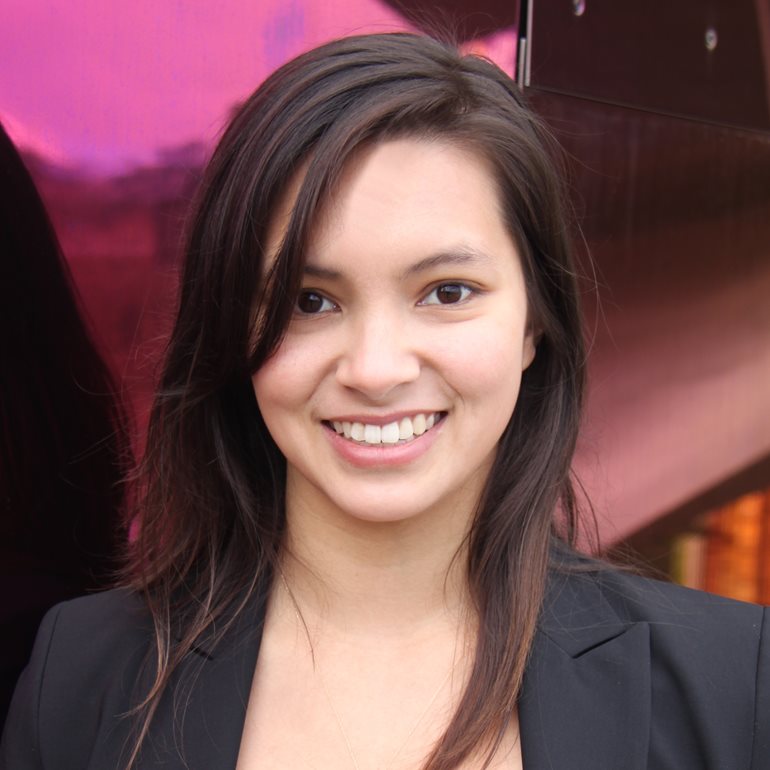
By Douglas Esser
Among the accomplishments Adina Mangubat lists on her LinkedIn page is her Forbes magazine “30 under 30 — Science and Health” recognition that places her among the “entrepreneurial, creative and intellectual best of their generation.”
She also proudly includes winning the 2009 Hell Night business plan competition at the University of Washington Bothell. It was more significant, she said. It changed her career direction.
“That was the moment I realized I could do this. It opened up a whole new opportunity,” said Mangubat, co-founder and CEO of Spiral Genetics, a Seattle biotechnology firm. “Not get a job and work your way up or get more education, but I could create something on my own and really make the kind of difference I wanted to make in the world, and I didn’t have to wait.”
A Hell Night to remember
Mangubat, who graduated with a degree in Psychology in 2009, was in her senior year at the UW in Seattle and somewhat uncertain about plans for work or graduate school when a friend recommended the entrepreneurship course he took in the School of Business at UW Bothell.
She decided to make the trip to the Bothell campus for the course taught by Alan Leong, a lecturer. He guided students in forming teams of people with ideas and skills to create plans for new businesses.
The class culminated in a competitive event called “Hell Night” where teams of students pitched their ideas to visitors who played the role of angel investors. The investors were given “cash,” which they invested with teams. The team with the most cash won.
Making the final pitch was one of the most impactful experiences of her life, Mangubat said. The business plan that her team pitched evolved into Spiral Genetics.
Patterns in genetic data
Spiral refers to the strands of DNA. Mangubat’s company makes software to analyze the human genome of whole populations.
The first mapping of all the genes in human DNA was completed in 2003. Since then, more than a million have been sequenced, but they amount to less than 1% of what is known about human variation, Mangubat said.
“We make the software to compare the complete sequences of hundreds of thousands or ultimately millions of people. We are looking for the patterns that will allow us to understand what’s really happening in the genome, to figure out what is the mechanism behind it,” she said. “Ultimately, if we can see those patterns, that will power novel discoveries that lead to diagnostics or even new drugs.”
For example, we know that most inherited cases of breast cancer are associated with mutations in genes known as BRCA, Mangubat said, and it’s likely that many diseases are caused by more-complicated interactions between genes.
Spiral Genetics works with genetic testing companies that want to improve their accuracy of diagnosis and with countries that want to identify health risks in their populations. The company helps them make sense of genetic data that is donated or collected voluntarily as part of health procedures.
Hell bent on succeeding
After starting Spiral Genetics at the age of 22, Mangubat was recognized by Forbes in 2013. She made a Forbes list again in 2017 as a “30 under 30 All Star Alumni” chronicling “the brashest entrepreneurs across the United States and Canada.”
Mangubat has led the company through a merger and a relaunching. She remains in touch with Leong and some of his other disruptive innovators, such as Matthew Scholz, another biotech CEO.
“There’s a Hell Night community,” said Mangubat, who returned as a Hell Night coach or angel investor, continuing support when Leong moved to the Foster School of Business at the UW in Seattle.
Along with Leong and his focus on entrepreneurship, part of what made UW Bothell so impactful was the diversity of the students — “diverse age group, diverse experience, diverse background,” Mangubat said. “It made all the difference for me being able to take on something like I did.”
One member of her team was a molecular biologist with a Ph.D. and years of experience in the field. She became a co-founder of Spiral Genetics.
With 99% of human variation remaining to be decoded, there’s a lot of potential work for Spiral Genetics and its ambitious CEO.
“I’m hell bent on transforming our relationship with disease,” Mangubat said.



